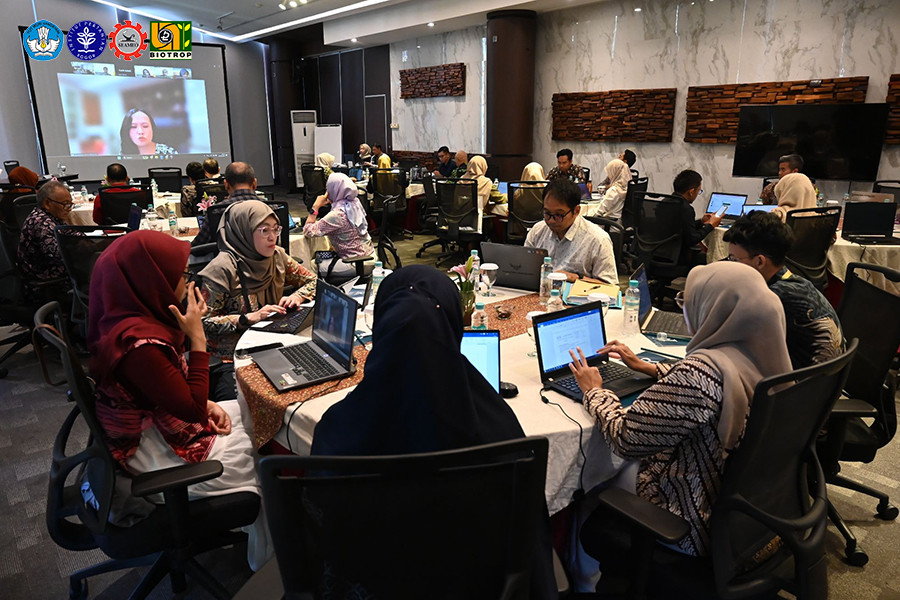SEAMEO BIOTROP successfully convened the 2nd Strategic Consultative Meeting on 3–5 September 2025 at R Hotel Rancamaya, Bogor, in a hybrid format that combined on-site and online participation. This meeting was a continuation of the first consultative session held in August and focused on refining the draft policy brief entitled “Breaking the Chain of Food Waste Early: Empowering Schools as Agents of Change.” The event drew strong participation from government ministries and agencies, international organizations, academics, schools, and practitioners, reflecting broad commitment to addressing food waste through the education sector.
The meeting featured contributions from key figures including Dr. Ir. Dadan Hindayana, Head of the National Nutrition Agency; Soepriati, SE, M.Si, representing the National Food Agency; Dr. Irsyad Zamjani, senior education expert; Vivi Andriani, Head of the Bureau of Planning, Cooperation, and Standardization at the Ministry of Primary and Secondary Education; and Dr. Supriyanto, Affiliate Scientist of SEAMEO BIOTROP. Representatives from FAO Indonesia, universities, and partner schools also provided valuable perspectives. Discussions emphasized the urgency of aligning the policy brief with the Presidential “Asta Cita” program and SDG 12 on responsible consumption and production.
Among the key recommendations were the integration of food waste indicators into the Dapodik and Education Report Card systems, strengthening teacher and school capacity, embedding responsible consumption into the national curriculum, and optimizing existing initiatives such as Adiwiyata and Healthy Canteen programs rather than creating new parallel models. Dr. Irsyad Zamjani highlighted the need for clearer methodology, cost-benefit analysis, and a balanced approach between upstream factors such as student behavior and downstream waste management practices. Dr. Dadan Hindayana stressed the importance of local food utilization to reduce carbon emissions, while Soepriati reinforced the role of the National Food Agency in promoting sustainable food use and circular economy practices.
The policy brief was widely recognized as evidence-based and relevant, yet participants suggested improvements in structure, visual presentation, and communication style to ensure accessibility for both policymakers and the general public. Concise executive summaries, simplified graphics, and practical recommendations were seen as essential tools to secure attention and support from decision-makers.
The meeting concluded with consensus that schools and households form the most critical ecosystems for shaping food-related behaviors. Building sustainable habits among students, teachers, and parents, supported by clear SOPs and incentive mechanisms, was identified as key to breaking the cycle of food waste. Participants agreed that the policy brief must be strategic, practical, and implementable, serving as a catalyst for real change in schools while contributing to national and regional policies. With this shared commitment, SEAMEO BIOTROP is confident that the finalized policy brief will stand as a strategic reference for food waste reduction through education and will play a pivotal role in strengthening food security in Indonesia.
 Wednesday, 24 September 2025 on 10:46am
Wednesday, 24 September 2025 on 10:46am